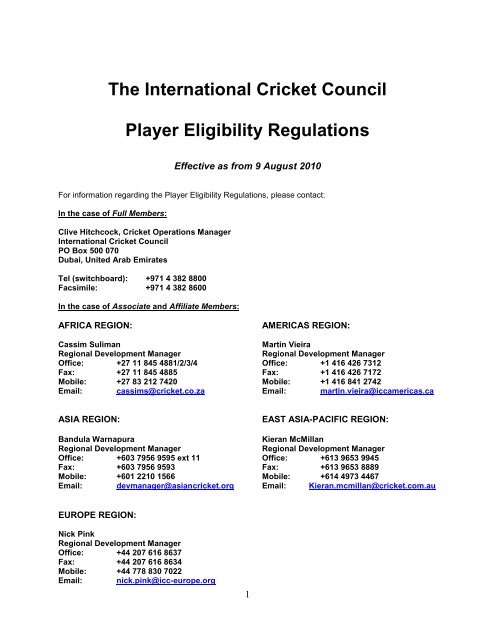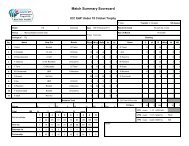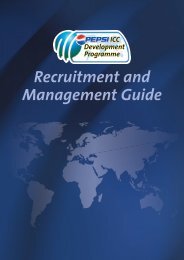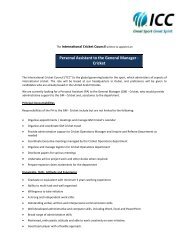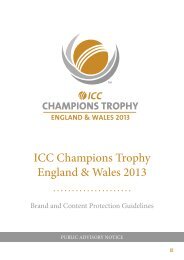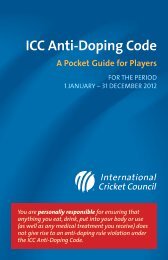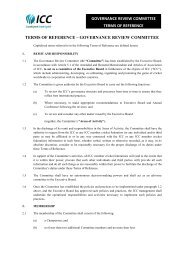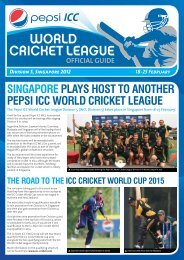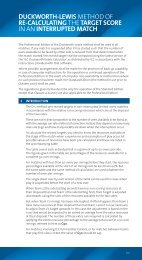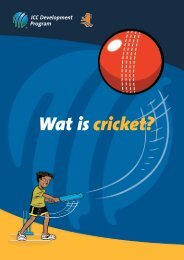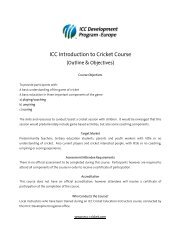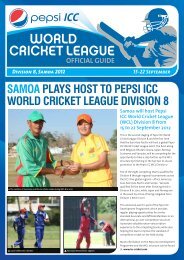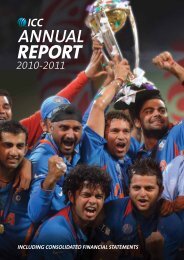Player Eligibility
Player Eligibility
Player Eligibility
Create successful ePaper yourself
Turn your PDF publications into a flip-book with our unique Google optimized e-Paper software.
The International Cricket Council<strong>Player</strong> <strong>Eligibility</strong> RegulationsEffective as from 9 August 2010For information regarding the <strong>Player</strong> <strong>Eligibility</strong> Regulations, please contact:In the case of Full Members:Clive Hitchcock, Cricket Operations ManagerInternational Cricket CouncilPO Box 500 070Dubai, United Arab EmiratesTel (switchboard): +971 4 382 8800Facsimile: +971 4 382 8600In the case of Associate and Affiliate Members:AFRICA REGION:AMERICAS REGION:Cassim SulimanMartin VieiraRegional Development ManagerRegional Development ManagerOffice: +27 11 845 4881/2/3/4 Office: +1 416 426 7312Fax: +27 11 845 4885 Fax: +1 416 426 7172Mobile: +27 83 212 7420 Mobile: +1 416 841 2742Email: cassims@cricket.co.za Email: martin.vieira@iccamericas.caASIA REGION:EAST ASIA-PACIFIC REGION:Bandula WarnapuraKieran McMillanRegional Development ManagerRegional Development ManagerOffice: +603 7956 9595 ext 11 Office: +613 9653 9945Fax: +603 7956 9593 Fax: +613 9653 8889Mobile: +601 2210 1566 Mobile: +614 4973 4467Email: devmanager@asiancricket.org Email: Kieran.mcmillan@cricket.com.auEUROPE REGION:Nick PinkRegional Development ManagerOffice: +44 207 616 8637Fax: +44 207 616 8634Mobile: +44 778 830 7022Email: nick.pink@icc-europe.org1
INTERNATIONAL CRICKET COUNCILINTRODUCTIONPLAYER ELIGIBILITY REGULATIONSThe ICC is the international federation responsible for the global governance of the sport of cricket andthe <strong>Player</strong> <strong>Eligibility</strong> Regulations (the “Regulations”) are adopted and implemented in order to: (a) clarifythe criteria relating to the eligibility of <strong>Player</strong>s to represent National Cricket Federations in InternationalMatches and ICC Events; and (b) provide guidance as to the procedures that need to be followed anddocuments that need to be produced when applying the qualification criteria set out herein.Unless otherwise indicated, references to Articles and Appendices are to articles and appendices of theRegulations. Words in italicised text in the Regulations are defined terms and their definitions are set outin Appendix 1.EXECUTIVE SUMMARYThe following section is an executive summary only of some of the key provisions of these Regulationsand does not form part of the operative Regulations which shall apply and be binding upon all NationalCricket Federations and <strong>Player</strong>s at all times. In the case of any conflict or ambiguity between thelanguage of the executive summary and the Regulations, the Regulations shall prevail.A. CORE QUALIFICATION CRITERIA:A <strong>Player</strong> shall be qualified to play for a National Cricket Federation where he/she satisfies at least oneof the following requirements:1. the <strong>Player</strong> was born in the relevant country;2. the <strong>Player</strong> is able to demonstrate (by his/her possession of a valid passport issued by the relevantcountry) that he/she is a national of the relevant country; or3. the <strong>Player</strong> is a Resident of the relevant country, in other words:3.1 the <strong>Player</strong> has resided in the relevant country for a minimum of 183 days in each of theimmediately preceding two years (female <strong>Player</strong>s only);3.2 the <strong>Player</strong> has resided in the relevant country for a minimum of 183 days in each of theimmediately preceding four years (male <strong>Player</strong>s only); or3.3 the <strong>Player</strong> has resided in the relevant country for a minimum of 183 days in each of theimmediately preceding seven years (male <strong>Player</strong>s only).B. ADDITIONAL DEVELOPMENT CRITERIA FOR ASSOCIATE OR AFFILIATE MEMBERS:In addition, where a male <strong>Player</strong> is seeking to qualify to play for an Associate or Affiliate Member, hemust also satisfy at least one of the following criteria:4. the <strong>Player</strong> has played in a minimum of 50% of the domestic league matches that his club teamwas scheduled to play within the relevant domestic structure in any 3 of the preceding 5 domesticleague seasons;5. the <strong>Player</strong> has spent a cumulative total of at least 100 working days in the relevant countrycoaching cricket, playing cricket or working in the administration or development of cricket in thatcountry in the immediately preceding 5 years; or6. the <strong>Player</strong> has previously represented the relevant country at Under-19 level or above aftersatisfying the additional Development Criteria in these Regulations or similar requirements under2predecessor eligibility regulations.
C. REPRESENTING MORE THAN ONE NATIONAL CRICKET FEDERATION:Nothing in the Regulations shall operate to prohibit a <strong>Player</strong> from representing more than one NationalCricket Federation during his/her playing career. However, the following additional requirements shallapply:7. where a male <strong>Player</strong> is seeking to qualify to play for a Full Member, he must not have participatedin an International Match for any other Full Member during the immediately preceding four years;8. where a male <strong>Player</strong> is seeking to qualify to play for an Associate or Affiliate Member, he must nothave participated in an International Match for any other National Cricket Federation (irrespectiveof its membership status) during the immediately preceding four years;9. where a female <strong>Player</strong> is seeking to qualify to play for any other National Cricket Federation(irrespective of its membership status), she must not have participated in an International Matchfor any other National Cricket Federation (irrespective of its membership status) during theimmediately preceding two years; and10. no <strong>Player</strong> shall be entitled to seek to qualify for a different National Cricket Federation more thanonce, unless the second qualification sought is for the same National Cricket Federation for whomhe/she originally played prior to his/her re-qualification.NOTE: No restrictions shall apply to any male <strong>Player</strong> seeking to qualify to play for a Full Memberwhere he has previously participated in an International Match for an Associate or AffiliateMember.D. SELECTION RESTRICTIONS FOR AFFILIATE AND ASSOCIATE MEMBERS:11. Except as described in 12, Affiliate and Associate Members may not select (as a member of astarting XI):11.1 more than two <strong>Player</strong>s in any team who qualify under 3.2, above; or11.2 more than two <strong>Player</strong>s in any team who have previously represented a Full Member atUnder-19 level of above.12. When playing: (a) against a Full Member; or (b) as part of an ICC Event in which other FullMembers are also participating; or (c) as part of the ICC World Cup Qualifying Tournament or ICCWorld Twenty20 Qualifying Tournament; or (d) in a One Day International Match or Twenty20International Match, then:12.1 the Selection Restrictions in 11 shall not apply; and12.2 the additional Development Criteria set out in Section B shall not apply.E. FURTHER NOTES:13. For the avoidance of doubt, none of the additional Development Criteria (Section B) or SelectionRestrictions (Section D) shall apply to female representative teams.14. The ICC’s Exceptional Circumstances Committee may recommend that an exemption be granted(by the ICC’s Cricket Committee Chairman) from full compliance with any of the Core QualificationCriteria and/or additional Development Criteria upon consideration of an application thatExceptional Circumstances exist to justify such exemption.3
2.4 Assistance, encouragement, aiding, abetting, covering up, or having any other type ofcomplicity in, any breach of any of Articles 2.1 to 2.3 (inclusive).2.4.1 Failure to comply with Article 2.4 is not a Strict Liability Offence. In other words, intent,knowledge, negligence or other fault must be demonstrated in order to establish a breachof Article 2.4.2.5 For the avoidance of any doubt:2.5.1 any Attempt to commit a breach of any of Article 2.1 to 2.4 (inclusive) shall be treated asan actual breach of the relevant Article; and2.5.2 where either of the ICC’s Cricket Operations Manager (in the case of Full Members) orthe ICC’s Tournament Director (in the case of Associate and Affiliate Members whoserepresentative teams are participating in a particular ICC Event) is required to considerwhether a <strong>Player</strong> is qualified to play in a particular International Match or ICC Event,he/she shall do so on the understanding that the information and supportingdocumentation provided by the National Cricket Federation and/or <strong>Player</strong> is accurate andup-to-date. However, any acceptance of the validity or accurateness of such informationand/or supporting documentation so that a <strong>Player</strong> is deemed qualified to play does notprevent a charge subsequently being brought against a National Cricket Federationand/or <strong>Player</strong> in relation to an alleged breach of any of Articles 2.1 to 2.4 (inclusive)where evidence of such offence only arises after it has been accepted that a <strong>Player</strong> isqualified to play. Nor does any such acceptance provide any form of defence to anysubsequent charge relating to an alleged breach under these Regulations, although itmay be taken into account when considering the appropriate sanction (if any) to beimposed in accordance with Article 8.ARTICLE 33ACRITERIA FOR REPRESENTING A NATIONAL CRICKET FEDERATIONCore Qualification Criteria:3.1 Subject strictly to the <strong>Player</strong>’s satisfaction of any of the additional Development Criteria set out inArticle 3.2 that may also apply, he/she shall be qualified to participate in an International Match orICC Event for a National Cricket Federation where he satisfies at least one of the followingrequirements (the “Core Qualification Criteria”):NOTE: The relevant information and documentation required to evidence satisfaction of the CoreQualification Criteria are described in Section 1 of Appendix 2. For Full Members, such informationmust be provided upon request by the ICC’s Cricket Operations Manager. For Associate and AffiliateMembers whose representative teams are participating in a particular ICC Event, such information (anddocumentation) must be provided in a timely fashion to the ICC Tournament Director.3.1.1 the <strong>Player</strong> was born in the country whose domestic cricket governing body is the NationalCricket Federation;3.1.2 at the date of submission of the relevant information to the ICC’s Cricket OperationsManager (in the case of Full Members) or the due date for submission of the selectedsquad lists (in the case of Associate and Affiliate Members whose representative teamsare participating in a particular ICC Event), the <strong>Player</strong> is able to demonstrate (by his/herpossession of a valid passport issued by the relevant country) that he/she is a national ofthe country whose domestic cricket governing body is the National Cricket Federation; or5
3.1.3 at the date of submission of the relevant information to the ICC’s Cricket OperationsManager (in the case of Full Members) or the due date for submission of the selectedsquad lists (in the case of Associate and Affiliate Members whose representative teamsare participating in a particular ICC Event), the <strong>Player</strong> is a Resident of the country whosedomestic cricket governing body is the National Cricket Federation. For the purposes ofthis Article, the following <strong>Player</strong>s will be deemed to be a ‘Resident” of a particular country:(a) a female <strong>Player</strong> who has resided in the relevant country for a minimum of 183days in each of the immediately preceding two years, shall be deemed to be a“2-Year Resident” of that country;(b)(c)(d)a male <strong>Player</strong> who has resided in the relevant country for a minimum of 183 daysin each of the immediately preceding four years, shall be deemed to be a “4-Year Resident” of that country;a male <strong>Player</strong> who has resided in the relevant country for a minimum of 183 daysin each of the immediately preceding seven years, shall be deemed to be a “7-Year Resident” of that country; orwhere the <strong>Player</strong> does not meet any of the criteria set out in Articles 3.1.3(a)–(c),but the Exceptional Circumstances Committee determines, in accordance withthe procedure described in Article 5, that Exceptional Circumstances exist tojustify the <strong>Player</strong>’s qualification as a 2-Year, 4-Year or 7-Year Resident for thepurposes of participation in an International Match or ICC Event.NOTES:(1) For the purposes of Articles 3.1.3(a) –(c), the ‘immediately preceding’ period shall mean therelevant period that immediately precedes the date of submission of the relevant information tothe ICC’s Cricket Operations Manager (in the case of Full Members) or the due date forsubmission of the selected squad lists (in the case of Associate and Affiliate Members whoserepresentative teams are participating in a particular ICC Event). For example, if the selectedsquad lists are due on 1 April 2011, for a female <strong>Player</strong> to qualify as a 2-Year Resident, shemust have resided in the relevant country for a minimum of 183 days in the period 1 April 2010 –31 March 2011 and for a minimum of 183 days in the period 1 April 2009 – 31 March 2010, sothat it is not possible for a <strong>Player</strong> to qualify as a 2-Year Resident unless she has resided in therelevant country for an minimum period of at least 1½ years. Similarly for a male <strong>Player</strong> toqualify as a 4-Year or 7-Year Resident, he must have resided in the relevant country for at least3½ years (in the case of a 4-Year Resident) or 6½ years (in the case of a 7-Year Resident).(2) Exceptional Circumstances - For example, if a <strong>Player</strong> resides in a country for 3 continuousyears but then moves abroad to attend school or university for a period of time before returningto the original country of residence where he/she resides for a further year, it may be open forthe Exceptional Circumstances Committee to determine that Exceptional Circumstances exist tojustify the determination of this <strong>Player</strong> as a 4-Year Resident notwithstanding that he/she has notmet the continuous 4-Year residency criteria set out in Article 3.1.3(b), above.If the same <strong>Player</strong> resides in the country for a further 3 continuous years, it may be open for theExceptional Circumstances Committee to determine that Exceptional Circumstances exist tojustify the determination of this <strong>Player</strong> as a 7-Year Resident notwithstanding that he/she has notmet the continuous 7-Year residency criteria set out in Article 3.1.3(c), above.Other factors that the Exceptional Circumstances Committee are likely to take into account in thedetermination of whether Exceptional Circumstances exist for these purposes include (withoutlimitation): (a) the length of time that the <strong>Player</strong> may be out of the relevant country; (b) thecontinuous period of residence in the country before and after any period of absence; (c) thereason for any absence, ie personal, study or work-related; and (d) the presence of previousand/or continuing links/ties between the <strong>Player</strong> and the relevant country and/or to cricket in thatcountry.6
3BAdditional Development Criteria for male teams representing Associate or AffiliateMembers:3.2 In addition, where a male <strong>Player</strong> is seeking to qualify to participate in an International Match orICC Event for a National Cricket Federation that is an Associate or Affiliate Member he must alsosatisfy, by providing in a timely fashion to the ICC’s Tournament Director the relevant informationand documentation described in Section 2 of Appendix 2, at least one of the following criteria (the“Development Criteria”):3.2.1 the <strong>Player</strong> has played in a minimum of 50% of the domestic league matches that the clubteam of which he is a member was scheduled to play within the relevant National CricketFederation’s domestic structure in any 3 of the immediately preceding 5 domestic leagueseasons;NOTE: If the domestic season runs from 1 April to 1 October each year and the relevant squadlist is due on 1 July 2010 (ie mid-way through a domestic season), then, for these purposes, the‘immediately preceding 5 domestic league seasons’ shall ordinarily mean 1 April to 1 October ineach of 2005, 2006, 2007, 2008 and 2009. However, where the <strong>Player</strong> has, by 1 July 2010,played in at least 50% of the domestic league matches scheduled for the entire 2010 season,then, notwithstanding that the 2010 domestic season has not been completed by that time, the‘immediately preceding 5 domestic league seasons’ shall mean 1 April to 1 October in each of2006, 2007, 2008, 2009 and 1 April to 1 July in 2010.3.2.2 the <strong>Player</strong> has spent a cumulative total of at least 100 working days in the country whosedomestic governing body is the National Cricket Federation in the immediately preceding5 years, coaching cricket, playing cricket or working in the administration or developmentof cricket in that country;NOTE: For these purposes: (a) ‘immediately preceding 5 years’ shall mean the 5-year period thatimmediately precedes the due date for submission to the ICC’s Tournament Director of theselected squad lists; (b) a ‘working day’ can be any day of the week or weekend provided that fora day to ‘count’ towards the 100 day requirement, the <strong>Player</strong> must have worked for eight hours onthat particular day; and (c) where the <strong>Player</strong> is employed in a part-time capacity (or otherwiseworks for less than 8 hours a day), then any other equivalent combination of days/hours workedmay be considered acceptable (eg 200 days working for 4 hours a day).For the avoidance of any doubt, any time spent ‘training’ to play cricket shall not count towardsthe 100 day requirement.3.2.3 the <strong>Player</strong> has previously represented the National Cricket Federation in either of thefollowing two specific circumstances:(a)(b)prior to 7 July 2006 - in any International Match or ICC Event (at Under-19 levelor above) at all; oron or after 7 July 2006 – in any International Match or ICC Event (at Under-19level or above) to which Articles 3.2.1 and/or 3.2.2 of the Development Criteria inthese Regulations (or earlier versions of the same) applied and which the <strong>Player</strong>formally satisfied at the time of participation; or3.2.4 where the <strong>Player</strong> does not meet any of the criteria set out in Articles 3.2.1 to 3.2.3, butthe ICC’s Cricket Committee Chairman determines, at his sole discretion (taking intoaccount any recommendation of the Exceptional Circumstances Committee), inaccordance with the procedure described in Article 5, that Exceptional Circumstancesexist which demonstrate the <strong>Player</strong>’s genuine commitment to the development of the7
sport of cricket in the country whose domestic governing body is the National CricketFederation.3C<strong>Eligibility</strong> to represent more than one National Cricket Federation:3.3 Nothing in Articles 3.1 or 3.2 shall operate to prohibit a <strong>Player</strong> from representing more than oneNational Cricket Federation during his/her playing career. However, where a <strong>Player</strong> hasrepresented a National Cricket Federation (at Under-19 level or above) and subsequently seeksto play for a different National Cricket Federation, the following additional requirements shallapply:3.3.1 a male <strong>Player</strong> will only qualify to play in an International Match or ICC Event for a FullMember National Cricket Federation if he has not participated (as a member of a startingXI or as a non-playing official substitute) in an International Match (at Under-19 level orabove) for any other Full Member National Cricket Federation during the four yearsimmediately preceding the date of the relevant International Match or ICC Event;COMMENT: For the purposes of these Regulations, the following matches shall not constitutean ‘International Match’:- any Under-19 national team (or similarly branded U19 XI) match which has been bilaterallyarranged between National Cricket Federations and/or their members, clubs etc;- any national “A” team, “B” team, ‘Academy XI’, ‘Development XI’, ‘Chairman’s XI’ or othersimilarly branded non-first XI match which has been bi-laterally arranged betweenNational Cricket Federations and/or their members, clubs etc,so that: (i) no time restriction under Article 3.3.1 shall be applied to any male <strong>Player</strong> that has onlyever represented a Full Member National Cricket Federation in any of the matches describedherein before he is eligible to qualify to play for another Full Member National CricketFederation; and (ii) where a male <strong>Player</strong> has previously played for a Full Member NationalCricket Federation in an International Match, he/she shall only be eligible to qualify to play foranother Full Member National Cricket Federation after the full four year period following the<strong>Player</strong>’s last participation (as a member of a starting XI or as a non-playing official substitute) inan International Match for the original Full Member National Cricket Federation has elapsed.3.3.2 a male <strong>Player</strong> will only qualify to participate in an International Match or ICC Event for anAssociate or Affiliate National Cricket Federation if he has not participated (as a memberof a starting XI or as a non-playing official substitute) in an International Match (at Under-19 level or above) for any other National Cricket Federation (irrespective of its ICCmember status) during the four years immediately preceding the date of the relevantInternational Match or ICC Event; and3.3.3 a female <strong>Player</strong> will only qualify to participate in an International Match or ICC Event forany National Cricket Federation (irrespective of its ICC member status) if she has notparticipated (as a member of a starting XI or as a non-playing official substitute) in anInternational Match (at Under-19 level of above) for any other National Cricket Federation(irrespective of its ICC member status) during the two years immediately preceding thedate of the relevant International Match or ICC Event.3.4 For the avoidance of doubt, no such restrictions shall apply to any <strong>Player</strong> who is seeking toqualify to play in an International Match or ICC Event for a Full Member National CricketFederation in circumstances where such <strong>Player</strong> has previously played in an International Matchor ICC Event for an Associate or Affiliate Member National Cricket Federation.8
3.5 No <strong>Player</strong> shall be entitled to seek to qualify for a different National Cricket Federation on morethan one occasion, unless the second qualification sought by the <strong>Player</strong> is to represent the sameNational Cricket Federation for whom he/she previously played prior to re-qualification.NOTE: This Article therefore prohibits a <strong>Player</strong> from qualifying to play for country “Z” after he/she haspreviously played for countries “X” and “Y”, but permits a <strong>Player</strong> re-qualifying to play for country “X” afterrepresenting country “Y” in circumstances where country “X” was the original country for whom he/shewas originally qualified to represent.ARTICLE 4SELECTION RESTRICTIONS FOR NATIONAL MALE TEAMS REPRESENTINGAFFILIATE AND ASSOCIATE MEMBERS4.1 Except in the limited circumstances described in Article 4.2, Affiliate and Associate Members maynot select:4.1.1 more than two <strong>Player</strong>s as members of the starting XI for a team chosen to represent itsNational Cricket Federation in an International Match or ICC Event who qualify as 4-YearResidents, as described in Article 3.1.3(b); or4.1.2 more than two <strong>Player</strong>s as members of the starting XI for a team chosen to represent itsNational Cricket Federation in an International Match or ICC Event who have previouslyrepresented a Full Member National Cricket Federation in an International Match (atUnder-19 level or above).NOTE: There is no restriction on: (a) the number of <strong>Player</strong>s who qualify as 4-Year Residents that canbe selected by a Full Member National Cricket Federation to participate in an International Match; or(b) the number of <strong>Player</strong>s qualifying as 7-Year Residents that can be selected by any Affiliate,Associate or Full Member National Cricket Federation to participate in an International Match.4.2 Where an Affiliate or Associate Member is playing in an International Match in any of the followingcircumstances: (a) against a Full Member; (b) as part of an ICC Event in which other FullMembers are also participating; (c) as part of the ICC World Cup Qualifying Tournament or ICCWorld Twenty20 Qualifying Tournament or (d) which is a One Day International Match orTwenty20 International Match, then:4.2.1 the Selection Restrictions set out in Articles 4.1.1 and 4.1.2 shall not apply, so that therelevant Affiliate or Associate Member may select as many 4-Year Residents and/or<strong>Player</strong>s that have represented Full Member National Cricket Federations (at Under-19level or above) as it wishes in any team representing its National Cricket Federation inthat particular International Match; and4.2.2 the Development Criteria shall be suspended for the purposes of that International Matchonly, so that it shall not be a requirement that all <strong>Player</strong>s selected to represent theAffiliate or Associate Member in that International Match must meet the additionalDevelopment Criteria set out in Article 3.2.9
ARTICLE 5EXCEPTIONAL CIRCUMSTANCES5.1 The following may each be exclusively submitted to the Exceptional Circumstances Committee bythe relevant National Cricket Federation for consideration and recommendation to the ICC’sCricket Committee Chairman, who shall determine at his sole discretion (taking into account anyrecommendation of the Exceptional Circumstances Committee) whether ExceptionalCircumstances exist:5.1.1 to justify a <strong>Player</strong>’s qualification as a 2-Year, 4-Year, or 7-Year Resident for the purposesof participating in an International Match or ICC Event for a representative side of aNational Cricket Federation in accordance with Article 3.1.3;5.1.2 which demonstrate a <strong>Player</strong>’s genuine commitment to the development of the sport ofcricket in the country whose domestic governing body is the National Cricket Federationin accordance with Article 3.2.4; or5.1.3 to justify granting an exemption from full compliance with any of the Core QualificationCriteria and/or Development Criteria described in Articles 3 and/or 4 for any particularInternational Match or ICC Event.5.2 All applications to the Exceptional Circumstances Committee must be made on the ICC templateform titled ‘Application for Exceptional Circumstances’, a copy of which is attached at Appendix 7of these Regulations, as soon as possible and, in any event, no later than sixty (60) days prior tothe relevant International Match or ICC Event in which the representative side of the relevantNational Cricket Federation is scheduled to participate in.5.3 The application must be accompanied by all of the relevant documentary evidence andsubmissions that the National Cricket Federation wishes to rely on, including (where applicable),the ICC template form titled ‘Data Summary for Resident <strong>Player</strong>s’, a copy of which is attached atAppendix 5 of these Regulations.5.4 The Exceptional Circumstances Committee shall be free to take into account all matters which itdeems to be relevant to the application but will not consider itself to be bound by any previousdecisions on similar sets of facts. It will evaluate and make a recommendation upon theapplication to the ICC’s Cricket Committee Chairman as quickly as is reasonably practicablebased only upon the documentation that has been presented to it. In the meantime, the NationalCricket Federation shall not assume that its application for Exceptional Circumstances will begranted by a particular time, or at all.5.5 The decision of the ICC’s Cricket Committee Chairman (who shall take into account but shall notbe bound by any recommendation of the Exceptional Circumstances Committee) will becommunicated to the National Cricket Federation as soon as is reasonably practicable after it ismade. If the application is successful, then the decision will become effective as of the date thatthe National Cricket Federation receives notice of such decision. For the avoidance of doubt, thedecision of the ICC’s Cricket Committee Chairman is non-appealable and shall be the full, finaland complete disposition of the matter and will be binding on all parties.5.6 Any decision that Exceptional Circumstances exist may be made with effect for a specified period(which may be for a specific International Match or ICC Event only) and may be subject to suchconditions or restrictions as the ICC’s Cricket Committee Chairman may consider appropriate toimpose.10
ARTICLE 6INVESTIGATIONS AND NOTICE OF CHARGE6.1 Any allegation or suspicion of a breach of these Regulations, whatever the source, shall be referredto the ICC’s Head of Legal for investigation and possible charge in accordance with Article 6.3.6.2 As part of any such investigation, if the ICC Head of Legal reasonably suspects that a NationalCricket Federation and/or a <strong>Player</strong> has committed an offence under these Regulations, he/she maymake a written demand to such National Cricket Federation and/or <strong>Player</strong> (a “Demand”) to furnish tohim/her any information that is reasonably related to the alleged offence, including, without limitation,copies of all documentation relating to the alleged breach (such as passports, entry visas, relevantemployment contracts, records of playing and travel etc). The National Cricket Federation and/or<strong>Player</strong> shall cooperate fully with any such Demand, including by furnishing the required informationwithin such reasonable period of time as may be determined by the ICC’s Head of Legal.6.3 Where, following an investigation, the ICC’s Head of Legal determines that there is a case to answerunder Article 2, the National Cricket Federation and/or <strong>Player</strong> (as applicable) shall be sent writtennotice of the following (the “Notice of Charge”):6.3.1 that the National Cricket Federation and/or <strong>Player</strong> has a case to answer under Article 2;6.3.2 the specific offence(s) that the National Cricket Federation and/or <strong>Player</strong> is alleged to havecommitted;6.3.3 details of the alleged acts and/or omissions relied upon in support of the charge;6.3.4 that (where a case to answer has been determined during an ICC Event), any continuedselection by the National Cricket Federation of the <strong>Player</strong> in that ICC Event will be at theNational Cricket Federation’s risk and may be considered as a relevant factor to be takeninto account by a Judicial Commissioner when considering the appropriate sanction to beimposed for any offence that may subsequently be demonstrated; and6.3.5 the matters relating to responding to a Notice of Charge specified at Article 6.4.6.4 Responding to a Notice of Charge6.4.1 The Notice of Charge shall also specify that, if the National Cricket Federation and/or <strong>Player</strong>(as applicable) wishes to exercise its/his/her right to a hearing before a JudicialCommissioner, it/he/she must submit a written request for such a hearing so that it isreceived by the ICC’s Head of Legal as soon as possible, but in any event within fourteen(14) days of the receipt by the National Cricket Federation and/or <strong>Player</strong> of the Notice ofCharge. The request must also state how the National Cricket Federation and/or <strong>Player</strong>responds to the charge(s) and must explain (in summary form) the basis for such response.6.4.2 If the National Cricket Federation or <strong>Player</strong> fails to file a written request for a hearing beforea Judicial Commissioner by the deadline specified in Article 6.5.1, then it/he/she shall bedeemed to have: (a) waived its/his/her entitlement to a hearing; and (b) admitted thatit/he/she has committed the offence(s) under these Regulations specified in the Notice ofCharge.6.4.3 In such circumstances, a hearing before the Judicial Commissioner shall not be required.Instead, the ICC’s Head of Legal shall promptly issue a public decision confirming theoffence(s) under these Regulations specified in the Notice of Charge and the imposition ofan applicable sanction from within the range specified in the Notice of Charge.11
6.4.4 Where the National Cricket Federation and/or <strong>Player</strong> does request a hearing in accordancewith Article 6.4.1, the matter shall proceed to a hearing in accordance with Article 7.ARTICLE 7THE DISCIPLINARY PROCEDURE7.1 Hearings under these Regulations7.1.1 Where the ICC alleges that a National Cricket Federation and/or <strong>Player</strong> has committed anoffence under these Regulations, and the National Cricket Federation and/or <strong>Player</strong> deniesthe allegation, and/or disputes the sanctions to be imposed for such offence under theseRegulations, then the matter shall be referred to the Judicial Commissioner (who shall not befrom the same country as that represented by the relevant National Cricket Federation) whoshall hear the case sitting alone.7.1.2 The Judicial Commissioner shall convene a preliminary hearing with the ICC and its legalrepresentatives, together with the National Cricket Federation and/or <strong>Player</strong> and its/his/herlegal representatives (if any). The preliminary hearing should take place as soon aspossible by telephone conference call unless the Judicial Commissioner determinesotherwise.7.1.3 The purpose of the preliminary hearing shall be to allow the Judicial Commissioner toaddress any issues that need to be resolved prior to the hearing date. In particular (butwithout limitation), the Judicial Commissioner shall:7.1.3.1 determine the date(s) upon which the full hearing shall be held. Save inexceptional circumstances or where the parties otherwise agree, the fullhearing should take place no longer than thirty (30) days after the receipt bythe National Cricket Federation and/or <strong>Player</strong> of the Notice of Charge;7.1.3.2 establish dates reasonably in advance of the date of the full hearing bywhich:(a)(b)(c)the ICC shall submit an opening brief with argument on all issuesthat the ICC wishes to raise at the hearing and a list of the witnessesthat the ICC intends to call at the hearing (and a summary of thesubject areas of the witness’s anticipated testimony), and enclosingcopies of the exhibits that the ICC intends to introduce at thehearing;the National Cricket Federation and/or <strong>Player</strong> shall submit ananswering brief, addressing the ICC’s arguments and setting outargument on the issues that it/he/she wishes to raise at the hearing,as well as a list of the witnesses that it/he/she intends to call at thehearing (and a summary of the subject areas of the witness’santicipated testimony), and enclosing copies of the exhibits thathe/she intends to introduce at the hearing; andthe ICC may (at its discretion) submit a reply brief, responding to theanswer brief of the National Cricket Federation and/or <strong>Player</strong> andlisting any rebuttal witnesses that the ICC intends to call at thehearing (and a summary of the subject areas of the witness’santicipated testimony), and enclosing copies of any other exhibitsthat the ICC intends to introduce at the hearing; and12
7.1.3.3 make such order as the Judicial Commissioner shall deem appropriate inrelation to the production of relevant documents and/or other materialsbetween the parties.7.1.4 Subject to the discretion of the Judicial Commissioner to order otherwise for good causeshown by either party, or unless otherwise agreed between the parties, hearings before theJudicial Commissioner shall: (a) take place at the ICC’s headquarters in Dubai, United ArabEmirates; and (b) be conducted on a confidential basis.7.1.5 Each of the ICC and the National Cricket Federation and/or <strong>Player</strong> (as applicable) has theright to be present and to be heard at the hearing to be represented at the hearing by legalcounsel of its/his/her own choosing. Where there is compelling justification for the nonattendanceby any party or representative at the hearing, then such party or representativeshall be given the opportunity to participate in the hearing by telephone or video conference(if available).7.1.6 Without prejudice to Article 7.2.2.2, the National Cricket Federation and/or <strong>Player</strong> maychoose not to appear in person at the hearing, but instead provide a written submission forconsideration by the Judicial Commissioner, in which case the Judicial Commissioner shallconsider the submission in its deliberations. However, the non-attendance of the NationalCricket Federation and/or <strong>Player</strong> (or its/his/her representative) at the hearing, after propernotice of the hearing has been provided, without compelling justification, shall not preventthe Judicial Commissioner from proceeding with the hearing in its/his/her absence, whetheror not any written submissions are made on its/his/her behalf.7.1.7 The procedure followed at the hearing shall be at the discretion of the JudicialCommissioner, provided that the hearing is conducted in a manner which offers the NationalCricket Federation and/or <strong>Player</strong> a fair and reasonable opportunity to present evidence(including the right to call and to question witnesses by telephone or video-conference wherenecessary), address the Judicial Commissioner and present its/his/her case.7.1.8 Save where the Judicial Commissioner orders otherwise for good cause shown by eitherparty, the hearing shall be in English, and certified English translations shall be submitted ofany non-English documents put before the Judicial Commissioner. The cost of thetranslation shall be borne by the party offering the document(s). If required by the JudicialCommissioner, the ICC shall make arrangements to have the hearing recorded ortranscribed (save for the private deliberations of the Judicial Commissioner). If requested bythe National Cricket Federation and/or <strong>Player</strong>, the ICC shall also arrange for an interpreter toattend the hearing. The costs of transcription and interpretation shall be paid by the ICC,subject to any costs-shifting order that the Judicial Commissioner may make further toArticle 7.3.3.7.2 Standard of Proof and Evidence7.2.1 The burden of proof shall be on the ICC and the standard of proof in all cases brought underthese Regulations shall be whether the Judicial Commissioner is comfortably satisfied,bearing in mind the seriousness of the allegation that is being made, that the alleged offencehas been committed. This standard of proof in all cases shall be determined on a slidingscale from, at a minimum, a mere balance of probability (for the least serious offences) up toproof beyond a reasonable doubt (for the most serious offences).7.2.2 The Judicial Commissioner shall not be bound by judicial rules governing the admissibility ofevidence. Instead, facts relating to an offence under these Regulations may be establishedby any reliable means, including admissions. The following rules of proof shall be applicableat the hearing:13
7.2.2.1 The Judicial Commissioner shall have discretion to accept any facts established bya decision of a court or professional disciplinary tribunal of competent jurisdictionwhich is not the subject of a pending appeal as irrebuttable evidence against theNational Cricket Federation and/or <strong>Player</strong> to whom the decision pertained of thosefacts, unless the National Cricket Federation and/or <strong>Player</strong> establishes that thedecision violated principles of natural justice.7.2.2.2 The Judicial Commissioner may draw an inference adverse to the National CricketFederation and/or <strong>Player</strong> who is asserted to have committed an offence under theseRegulations based on his/her refusal, without compelling justification, after a requestmade in a reasonable time in advance of the hearing, to appear at the hearing(either in person or telephonically as directed by the Judicial Commissioner) and toanswer any relevant questions.7.3 Decisions of the Judicial Commissioner7.3.1 The Judicial Commissioner shall announce his/her decision in writing, with reasons, as soonas possible after the conclusion of the hearing. That written decision will set out and explain:(a) with reasons, the Judicial Commissioner’s findings as to whether any offence(s) underthese Regulations has/have been committed and what sanctions, if any, are to be imposed;and (b) the rights of appeal described in Article 9. Any such written decision will beprovided to the National Cricket Federation and/or <strong>Player</strong> as soon as reasonably practicable.7.3.2 The Judicial Commissioner shall have discretion to announce the substance of his/herdecision to the parties prior to the issue of the written reasoned decision referred to in Article7.3.1 where it deems appropriate. For the avoidance of doubt, however: (a) the JudicialCommissioner shall still be required to issue a written, reasoned decision in accordance withArticle 7.3.1; and (b) the time to appeal pursuant to Article 9 shall not run until receipt of thatwritten, reasoned decision.7.3.3 The Judicial Commissioner has the power to make a costs order against any party to thehearing in respect of the costs of convening and of staging the hearing and/or in respect ofthe costs (legal, expert, travel, accommodation or otherwise) incurred by the parties inrelation to the proceedings if it considers that such party has acted spuriously, frivolously orotherwise in bad faith. If it does not exercise that power, the ICC shall pay the costs ofconvening and of staging the hearing, and each party shall bear its own costs (legal, expert,travel, accommodation or otherwise).7.3.4 Subject only to the rights of appeal under Article 9, the Judicial Commissioner’s decisionshall be the full, final and complete disposition of the matter and will be binding on all parties.ARTICLE 8SANCTIONS8.1 Where the Judicial Commissioner determines that an offence under these Regulations has beencommitted, he/she shall be entitled to impose upon the National Cricket Federation and/or <strong>Player</strong> (asapplicable) any one or more of the following sanctions that he/she deems appropriate, having regardto all of the circumstances of the case:8.1.1 a caution, reprimand and/or warning as to future conduct;8.1.2 in the case of the National Cricket Federation’s relevant cricket team, the adjustment,overturning or amendment of results achieved in, loss of points earned at, or disqualificationfrom the International Match or ICC Event in relation to which the offence has beencommitted and/or the imposition of a suspension from participation in any future International14
Match(es) or ICC Events and/or the relegation/removal from any ICC World Cricket LeagueDivision (or qualifying tournament thereto);8.1.3 in the case of the <strong>Player</strong>, the imposition of an appropriate period of Ineligibility (which maybe imposed immediately or at such other point in time as may be appropriate in thecircumstances, eg once the <strong>Player</strong> has subsequently qualified to play for the relevantcountry in accordance with the Regulations); and/or8.1.4 such other sanctions as the Judicial Commissioner shall consider appropriate, having regardto all of the circumstances of the case.8.2 Having determined that an offence under these Regulations has been committed, prior todetermining the applicable sanction(s) that are to be applied under Article 8.1, the JudicialCommissioner will first determine the relative seriousness of the offence, including identifying allrelevant factors that he/she deems to either aggravate or mitigate the nature of the offence, including(without limitation) whether or not: (a) the National Cricket Federation was aware that the relevant<strong>Player</strong> was not qualified to represent it (in the case of an offence under Article 2.1); (b) the NationalCricket Federation and/or the <strong>Player</strong> has previously been found guilty of any similar offence underthe Regulations or any predecessor regulations; and/or (c) the National Cricket Federation continuedto select the <strong>Player</strong> to participate in (and the <strong>Player</strong> did, in fact, participate in) an International Matchor ICC Event taking place after receipt by the National Cricket Federation of the Notice of Chargeissued pursuant to Article 6.3.ARTICLE 9APPEALS9.1 Decisions made under these Regulations by the Judicial Commissioner: (a) that an offence has (orhas not) been committed under these Regulations; and/or (b) to impose (or not impose) sanctions,including the appropriateness of the sanction imposed for an offence under these Regulations, maybe challenged solely by appeal as set out in this Article 9. Such decision shall remain in effect whileunder appeal unless any Appeal Panel properly convened to hear the appeal orders otherwise.9.2 The only parties who may appeal a decision of this nature shall be the relevant National CricketFederation and/or <strong>Player</strong> (as applicable) or the ICC’s Chief Executive Officer (or his/her designee).9.3 Any notice to appeal under this Article must be lodged with the ICC’s Head of Legal within 48 hoursof receipt of the written decision of the Judicial Commissioner. Thereafter, the following will apply:9.3.1 Within 7 days of receipt of a notice to appeal, the ICC’s Head of Legal will appoint threemembers of the ICC’s Code of Conduct Commission who shall act as the Appeal Panel inthis matter.9.3.2 The provisions of Article 7, applicable to proceedings before the Judicial Commissioner,shall apply mutatis mutandis (ie with changes deemed to have been made as required toreflect the different context) to appeal hearings before the Appeal Panel.9.3.3 The Appeal Panel shall hear and determine all issues arising from any matter which isappealed pursuant to this Article on a de novo basis, ie it shall hear the matter over again,from the beginning, without being bound in any way by the decision being appealed. For theavoidance of doubt, the Appeal Panel shall have the power to increase or decrease, amendor otherwise substitute a new decision on the appropriateness (or otherwise) of the sanctionimposed at first instance by the Judicial Commissioner, provided that (if appropriate) anynew sanction must be within the permitted range of sanctions set out in Article 8.15
9.3.4 Appeal hearings pursuant to this Article should be completed expeditiously. Save where allparties agree or fairness requires otherwise, the appeal hearing shall be commenced nolater than fourteen (14) days after the appointment of the Appeal Panel.9.3.5 The Appeal Panel shall have the power to order some or all of the costs of the appealproceedings (including the costs of holding the hearing, any interpretation costs, the legaland/or travel/accommodation costs of the Appeal Panel and/or any other relevant parties) tobe paid by the appealing party if he/she considers that such party has acted spuriously,frivolously or otherwise in bad faith.9.3.6 Any decision made by the Appeal Panel under this Article 9.3, shall be the full, final andcomplete disposition of the matter and will be binding on all parties.ARTICLE 10ICC’S PLAYER ELIGIBILITY DATABASE10.1 Where required, each National Cricket Federation must certify that each <strong>Player</strong> selected toparticipate in any International Match or ICC Event meets the Core Qualification Criteria (and,where applicable, the additional Development Criteria) within the timeframe specified (if any), byusing the forms provided by the ICC and by attaching the relevant documentation described inAppendix 2.10.2 Such certification must be submitted to the ICC’s Cricket Operations Manager (in the case of FullMembers) or the ICC’s Tournament Director (in the case of Associate and Affiliate Memberswhose representative teams are participating in a particular ICC Event).10.3 Each <strong>Player</strong> that meets the Core Qualification Criteria (and, where applicable, the additionalDevelopment Criteria) will thereafter be either permanently or temporarily registered on the ICC<strong>Player</strong> <strong>Eligibility</strong> Database, depending upon the manner in which the <strong>Player</strong> satisfies the CoreQualification Criteria (and, where applicable, the additional Development Criteria) and whetherthe same <strong>Player</strong> is required to re-apply for qualification at future International Matches or ICCEvents. All <strong>Player</strong>s shall be deemed to have agreed, for purposes of applicable data protectionand other laws and for all other purposes, to have consented to the collection, processing,disclosure and use of information relating to them, including personal information relating to them,as required to maintain an effective and up-to-date ICC <strong>Player</strong> <strong>Eligibility</strong> Database and toimplement these Regulations.ARTICLE 11AMENDMENT AND INTERPRETATION OF THE REGULATIONS11.1 The Regulations may be amended from time to time by the Executive Board of the ICC, with suchamendments coming into effect on the date specified by the ICC.11.2 The headings used for the various Articles of the Regulations are for the purpose of guidance onlyand shall not be deemed to be part of the substance of the Regulations or to inform or affect in anyway the language of the provisions to which they refer.11.3 The Regulations shall come into full force and effect on 9 August 2010 (the “Effective Date”). Theyshall not apply retrospectively to matters pending before the Effective Date.11.4 If any Article or provision of these Regulations is held invalid, unenforceable or illegal for any reason,the Regulations shall remain otherwise in full force apart from such Article or provision which shall bedeemed deleted insofar as it is invalid, unenforceable or illegal.16
11.5 These Regulations are governed by and shall be construed in accordance with English law. Strictlywithout prejudice to the arbitration provisions of Articles 5, 7 and 9 of the Regulations, disputesrelating to the Regulations shall be subject to the exclusive jurisdiction of the English courts.17
APPENDIX 1 - DEFINITIONSAffiliate Member. Any National Cricket Federation with affiliate member status of the ICC.Appeal Panel. A panel of three persons appointed by the ICC from the ICC’s Code of ConductCommission to perform the functions assigned to the Appeal Panel in these Regulations.Associate Member. Any National Cricket Federation with associate member status of the ICC.Attempt. Purposely engaging in conduct that constitutes a substantial step in a course of conductplanned to culminate in the commission of an offence under these Regulations.Core Qualification Criteria. As defined in Article 3.1.Demand. As defined in Article 6.2.Development Criteria. As defined in Article 3.2.Effective Date. As defined in Article 11.3.Exceptional Circumstances Committee. The ICC Committee made up of the following three people: (i)the ICC’s General Manager - Cricket (or his/her nominee); (ii) the ICC’s Head of Legal (or his/hernominee); and (iii) the ICC’s Global Development Manager (or his/her nominee) and formed to presideover all matters relating to the application and implementation of the Regulations, as described herein.Exceptional Circumstances. Certain factors that, because of their exceptional, unique or unusual nature,can be relied upon by the ICC’s Cricket Committee Chairman (at his/her sole discretion, but taking intoaccount any recommendations provided by the Exceptional Circumstances Committee) in the narrowcircumstances described in these Regulations to permit the departure from the otherwise strictrequirements of these Regulations.Full Member. Any National Cricket Federation with full member status of the ICC.Judicial Commissioner. The independent person appointed by the ICC from the ICC Code of ConductCommission, to perform the functions assigned to the Judicial Commissioner under these Regulations.ICC. The International Cricket Council or its designee.ICC’s Chief Executive Officer. The person appointed by the ICC from time to time to act as the ICC’sChief Executive Officer.ICC’s Code of Conduct Commission. An official committee of the ICC established, amongst other things,to provide independent enquiries, investigations and rulings in relation to matters brought to its attentionpursuant to the Regulations. Each member of the Code of Conduct Commission shall be independent ofthe ICC, which may provide reasonable compensation and reimbursement of expenses to such members.ICC’s Cricket Committee Chairman. The person appointed by the ICC from time to time to act as theChairman of the ICC’s Cricket Committee.ICC’s Cricket Operations Manager. The person appointed by the ICC from time to time to act as theICC’s Cricket Operations Manager.18
ICC Events. Each of the following: (a) the ICC Cricket World Cup; (b) the ICC World Twenty20; (c) theICC Champions Trophy; (d) the ICC World Cricket League Divisions 1-8 (inclusive), together with anyregional qualifying events thereto; (e) the ICC Women’s Cricket World Cup; (f) the ICC Under 19 CricketWorld Cup; (g) the ICC World Cup Qualifying Tournament; (h) the ICC Women’s Cricket World CupQualifying Tournament, together with any regional qualifying events thereto; (i) the ICC World Twenty20Qualifying Tournament; (j) the ICC Under 19 Cricket World Cup Qualifying Tournament, together with anyregional qualifying events thereto; (k) the ICC Intercontinental Cup and Shield; (l) any regional XI-a-sideMatch at Under 19 level or above; and (m) any other event organised or sanctioned by the ICC from timeto time to which the ICC deems it appropriate that the Regulations should apply.ICC’s Head of Legal. The person appointed by the ICC from time to time to act as the ICC’s Head ofLegal (or his/her designee).ICC’s Operating Manual. The ICC’s Official Operating Manual in force from time to time.ICC <strong>Player</strong> <strong>Eligibility</strong> Database. A database maintained by the ICC’s Cricket Operations Managercontaining such player information as may be determined relevant for the purposes of these Regulations.ICC’s Tournament Director. The person appointed by the ICC from time to time to act as the TournamentDirector for a relevant ICC Event (or his/her designee).Ineligibility. Means the <strong>Player</strong> is barred for a specified period of time from participation in any capacity inany International Match.International Match. Each of the following (in men’s and women’s cricket): (a) any Test Match, One DayInternational Match or Twenty20 International Match; (b) any Match played as part of an ICC Event; or (c) anyother Match organised or sanctioned by the ICC from time to time to which the ICC deems it appropriate thatthe Regulations should apply.Judicial Commissioner. The independent person appointed by the ICC from the ICC Code of ConductCommission, to perform the functions assigned to the Judicial Commissioner under the Regulations.Match. A cricket match of any format and duration in length played between representative teams (maleor female) of two National Cricket Federations affiliated to the ICC.National Cricket Federation. A national or regional entity which is a member of or is recognised by theICC as the entity governing the sport of cricket in a country (or collective group of countries associated forcricket purposes).Notice of Charge. As defined in Article 6.3.One Day International Match. As defined by Section 33 (ICC Classification of Official Cricket) of the ICC’sOperating Manual.<strong>Player</strong>. Any cricketer who is selected in any playing or touring team or squad that is chosen to represent aNational Cricket Federation in any International Match or series of International Matches.Resident. As defined in Article 3.1.3.Selection Restrictions. Each of the restrictions described in Articles 4.1 and 4.2.Strict Liability Offence. A Strict Liability Offence is one where it is not necessary to demonstrate intent,knowledge, negligence or other fault on the part of the National Cricket Federation or <strong>Player</strong> in order toestablish the commission of the offence; nor is the lack of intent, knowledge, negligence or other fault avalid defence to a charge of commission of the offence. For the avoidance of doubt, where the offence in19
question is admitted or established before a Judicial Commissioner, then (in accordance with Clause 8.2)evidence of intent, knowledge, negligence or other fault (or lack thereof) may be relevant to the issue ofwhat sanction(s) should be imposed.Test Match. As defined by Section 33 (ICC Classification of Official Cricket) of the ICC’s OperatingManual.Twenty20 International Match. As defined by Section 33 (ICC Classification of Official Cricket) of theICC’s Operating Manual.20
APPENDIX 2 – DOCUMENTS TO BE FILED TO PROVE SATISFACTIONOF CORE QUALIFICATION AND/OR DEVELOPMENT CRITERIANOTE: In the case of Associate and Affiliate Members, whose representative teams are participating in aparticular ICC Event, the following information and documentation must (where applicable) befiled at the same time as the Squad Registration Form is filed with the ICC’s Tournament Director.Copies of the applicable Squad Registration Forms are attached at Appendix 3 (for men’s events)and Appendix 4 (for women’s events).SECTION 1: Core Qualification Criteria (Article 3A)RELEVANT ARTICLEDOCUMENTS REQUIRED TO PROVESATISFACTION OF CORE QUALIFICATIONCRITERIAArticle 3.1.1: the <strong>Player</strong> was born in the country whosedomestic cricket governing body is the National CricketFederation. A. Copy of the title page of passport and relevantpage showing place of birth; OR B. Copy of official birth certificateEither A or B - MANDATORYArticle 3.1.2: at the date of submission of the relevantinformation to the ICC’s Cricket Operations Manager (inthe case of Full Members) or the due date for submissionof the selected squad lists (in the case of Associate andAffiliate Members whose representative teams areparticipating in a particular ICC Event), the <strong>Player</strong> is ableto demonstrate (by his/her possession of a valid passportissued by the relevant country) that he/she is a national ofthe country whose domestic cricket governing body is theNational Cricket Federation.Copy of the title page of passport and relevant pageshowing nationality – MANDATORYArticle 3.1.3: at the date of submission of the relevantinformation to the ICC’s Cricket Operations Manager (inthe case of Full Members) or the due date for submissionof the selected squad lists (in the case of Associate andAffiliate Members whose representative teams areparticipating in a particular ICC Event), the <strong>Player</strong> is aResident of the country whose domestic cricket governingbody is the National Cricket Federation. The ICC’s template form titled ‘Data Summary forResident <strong>Player</strong>s’, attached at Appendix 5, properlycompleted and signed by the relevant NationalCricket Federation and <strong>Player</strong> – MANDATORY Relevant information that confirms that the <strong>Player</strong>has been in the relevant country for the relevantperiod of time (eg a printout of time spent in thecountry from the relevant government department orcopies of passport pages showing relevant visaand/or entry date stamps) – MANDATORY21
SECTION 2: Development Criteria (Article 3B)The President/Chairman of the relevant National Cricket Federation must sign the relevant applicationconfirming that any particular <strong>Player</strong> meets at least one of the additional Development Criteria andprovide the relevant documentation described in the table below as ‘mandatory’.In addition, the ICC’s Tournament Director, Exceptional Circumstances Committee or ICC’s CricketCommittee Chairman retains the right to request at any time (including after a <strong>Player</strong> has played in therelevant International Match or ICC Event) further supplementary evidence should he/she/it so require.RELEVANT ARTICLEArticle 3.2.1: the <strong>Player</strong> has played in a minimum of 50%of the domestic league matches that the club team ofwhich he is a member was scheduled to play within therelevant National Cricket Federation’s domestic structurein any 3 of the preceding 5 domestic league seasons.DOCUMENTS REQUIRED TO PROVESATISFACTION OF DEVELOPMENT CRITERIA Confirmation letters from President/Chairman ofrelevant domestic club(s) - MANDATORY Score sheets from relevant domestic league matchesin which the domestic club team of which the <strong>Player</strong>was a member – IF REQUIRED Press clippings or other relevant documents fromprevious years demonstrating the extent of the<strong>Player</strong>’s participation for the relevant domestic clubteam – IF REQUIREDArticle 3.2.2: the <strong>Player</strong> has spent a cumulative total of atleast 100 working days in the country whose domesticgoverning body is the National Cricket Federation of thepreceding 5 years, coaching cricket, playing cricket orworking in the administration or development of cricket inthat country. A completed template form titled ‘Work Log For<strong>Player</strong>s’, attached at Appendix 6, providing all detailsof the scope of work completed and a breakdown ofthe days/hours worked during the relevant period –MANDATORY Confirmation letters from employer outlining scope ofwork completed and a breakdown of the days/hoursworked during the relevant period – IF REQUIRED22


